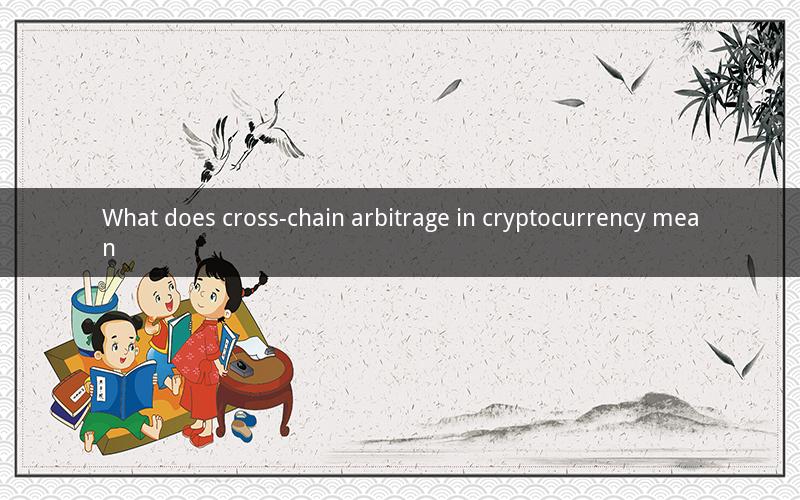
Cryptocurrency Cross-Chain Arbitrage: Unraveling the Concept
Table of Contents
1. Introduction to Cryptocurrency Cross-Chain Arbitrage
2. Understanding Cryptocurrency Prices
3. The Role of Blockchain Networks
4. The Mechanism of Cross-Chain Arbitrage
5. Identifying Arbitrage Opportunities
6. Risks and Challenges in Cross-Chain Arbitrage
7. Legal and Ethical Considerations
8. Case Studies: Real-Life Cross-Chain Arbitrage Examples
9. The Future of Cross-Chain Arbitrage
10. Conclusion
1. Introduction to Cryptocurrency Cross-Chain Arbitrage
Cross-chain arbitrage in cryptocurrency refers to the practice of taking advantage of price discrepancies between different blockchain networks. It involves buying a cryptocurrency at a lower price on one network and selling it at a higher price on another network, thereby profiting from the price difference.
2. Understanding Cryptocurrency Prices
Cryptocurrency prices are influenced by various factors, including supply and demand, market sentiment, technological advancements, and regulatory news. These factors can cause prices to fluctuate significantly, creating opportunities for arbitrage.
3. The Role of Blockchain Networks
Blockchain networks are the backbone of the cryptocurrency ecosystem. They enable secure, transparent, and decentralized transactions. Different blockchain networks have their unique features, consensus mechanisms, and governance models, which can affect their price dynamics.
4. The Mechanism of Cross-Chain Arbitrage
Cross-chain arbitrage involves the following steps:
- Identifying a price discrepancy between two blockchain networks.
- Buying the cryptocurrency at a lower price on one network.
- Transferring the cryptocurrency to the other network.
- Selling the cryptocurrency at a higher price on the second network.
- Profiting from the price difference.
5. Identifying Arbitrage Opportunities
To identify cross-chain arbitrage opportunities, traders must closely monitor cryptocurrency prices across different networks. They can use various tools and platforms, such as price comparison websites, cryptocurrency exchanges, and blockchain explorers, to track prices and identify discrepancies.
6. Risks and Challenges in Cross-Chain Arbitrage
While cross-chain arbitrage can be profitable, it also comes with risks and challenges:
- Transaction fees: High transaction fees can eat into profits.
- Slippage: Price changes during the transaction process can lead to losses.
- Network congestion: High network congestion can cause delays and increased transaction fees.
- Regulatory risks: Regulatory changes can impact cryptocurrency prices and arbitrage opportunities.
7. Legal and Ethical Considerations
Cross-chain arbitrage is a legitimate trading strategy, but it is essential to consider legal and ethical aspects:
- Compliance with regulations: Adhere to the regulations of the jurisdictions in which you are trading.
- Transparency: Be transparent about your trading activities and ensure that your actions are not manipulative.
- Fairness: Avoid engaging in activities that could harm the integrity of the cryptocurrency markets.
8. Case Studies: Real-Life Cross-Chain Arbitrage Examples
Several real-life examples demonstrate the potential of cross-chain arbitrage:
- Ethereum (ETH) to Binance Smart Chain (BSC) arbitrage: In 2021, a price discrepancy between ETH and BNB on Ethereum and BSC, respectively, allowed traders to profit from the difference.
- Solana (SOL) to Ethereum (ETH) arbitrage: Traders have taken advantage of price discrepancies between SOL and ETH on different exchanges.
9. The Future of Cross-Chain Arbitrage
The future of cross-chain arbitrage looks promising, driven by the increasing number of blockchain networks and the growing complexity of the cryptocurrency ecosystem. As more networks emerge and interconnect, the potential for arbitrage opportunities will expand.
10. Conclusion
Cross-chain arbitrage in cryptocurrency is a sophisticated trading strategy that takes advantage of price discrepancies between different blockchain networks. While it can be profitable, it is crucial to understand the risks, challenges, and legal considerations involved. As the cryptocurrency market evolves, cross-chain arbitrage is likely to play an increasingly significant role in the trading landscape.
Related Questions and Answers
1. What is the difference between cross-chain and inter-chain arbitrage?
- Cross-chain arbitrage involves different blockchain networks, while inter-chain arbitrage refers to transactions within the same blockchain network but across different blockchains or chains.
2. How can a trader identify potential cross-chain arbitrage opportunities?
- Traders can use price comparison websites, cryptocurrency exchanges, and blockchain explorers to monitor prices across different networks and identify discrepancies.
3. What are the common challenges faced by cross-chain arbitrage traders?
- Common challenges include transaction fees, slippage, network congestion, and regulatory risks.
4. Is cross-chain arbitrage legal in all jurisdictions?
- The legality of cross-chain arbitrage depends on the regulations of the jurisdictions in which the trader operates.
5. How can a trader minimize the risk of slippage in cross-chain arbitrage?
- Traders can minimize slippage by using limit orders, which allow them to specify the exact price at which they want to buy or sell a cryptocurrency.
6. What is the role of decentralized exchanges (DEXs) in cross-chain arbitrage?
- DEXs play a crucial role in cross-chain arbitrage by allowing traders to execute transactions without relying on centralized exchanges, thus reducing the risk of manipulation.
7. How does the introduction of new blockchain networks affect cross-chain arbitrage?
- The introduction of new blockchain networks can create new arbitrage opportunities and increase the complexity of the cryptocurrency ecosystem.
8. What is the impact of regulatory changes on cross-chain arbitrage?
- Regulatory changes can significantly impact the profitability and legality of cross-chain arbitrage, potentially leading to increased risks and challenges.
9. Can cross-chain arbitrage be automated?
- Yes, cross-chain arbitrage can be automated using algorithms and trading bots, which can execute trades based on predefined rules and conditions.
10. How does the concept of liquidity pools affect cross-chain arbitrage?
- Liquidity pools, which are used in decentralized exchanges, can affect cross-chain arbitrage by influencing the availability and price of cryptocurrencies across different networks.